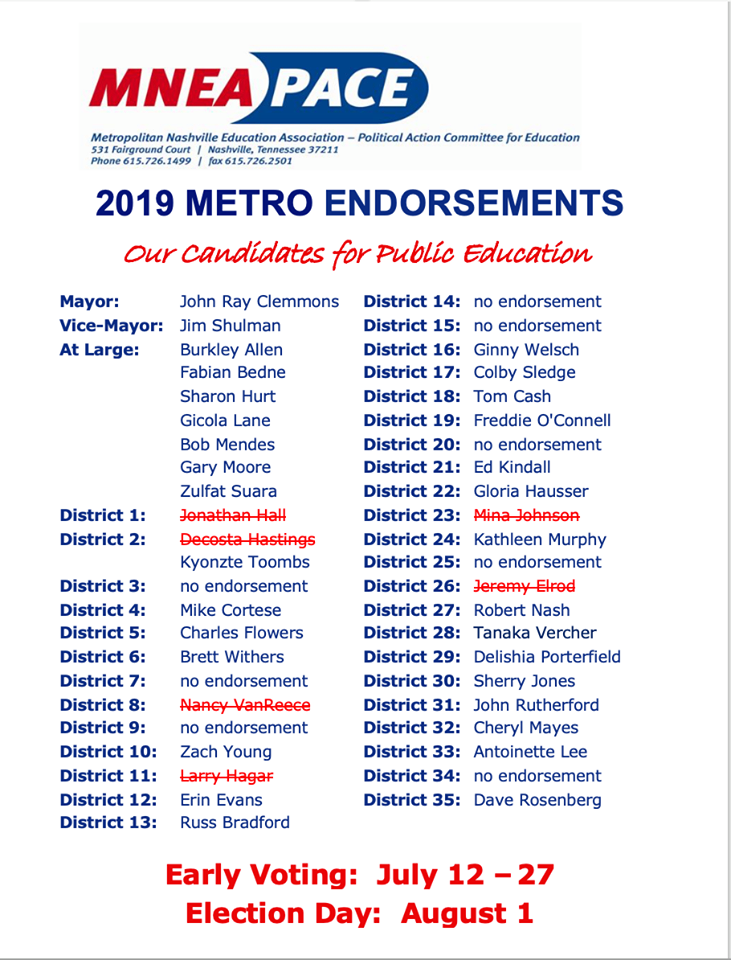It’s usually a good practice when applying for a job to let someone know if you’ve listed them as a reference. This way, they’re not surprised if they receive a call about you … and, you can be sure they’ll say something positive if they are called.
Turns out, this basic principle eluded MNPS Director of Schools candidate John Covington. Among his references, he listed the head of the local American Federation of Teachers affiliate. Impressive — if the head of the local teachers union would give the director a positive review.
Funny thing is: She wasn’t asked by Covington. Not by him. And, apparently, not by the search firm MNPS paid at least $40,000 to conduct a search.
Here’s what she said when she was asked: She wouldn’t recommend him for the job.
Here’s a release from the Metro Nashville Education Association (MNEA) outlining the issue and demanding a refund of the money paid to the search firm:
The Metropolitan Nashville Education Association (MNEA) is asking for a refund of the fee paid to the firm responsible for vetting candidates for the next MNPS Director. The association followed up with references supplied by controversial candidate John Covington and major questions have now arisen about the work and actions of the recruiting firm.
“After reviewing the difficulties and questionable actions of John Covington when he worked in Kansas City and Michigan, we wanted to follow up on some of the references supplied by him in his application,” said MNEA President-elect Erick Huth. “One name jumped out at us in particular, Andrea Flinders, the president of the Kansas City teachers’ union was listed as a reference by the candidate. So we called her.”
Huth noted that Covington was responsible for shuttering dozens of schools and eliminating teaching positions across the district, causing great turmoil. The school district lost its accreditation shortly after Covington left in a surprise decision. There are lingering questions about why he left—he denied having another job offer and then was appointed to a state takeover entity in Michigan in short order after his abrupt and disruptive departure from Kansas City.
To Nashville teachers, having an education organization president as a supporter of Covington was a false note. It turns out that is exactly what it was.
“We called the president of the Kansas City local about the reference and she laughed, thinking it was absurd,” said Huth. “She had not been asked by Covington to be a reference and had not been contacted by the search firm to verify her name being used. She was clear she would not recommend him for the job. This raises even more questions about the validity of the search and the documents supplied to the board.”
Huth cannot understand that with the prestige of Nashville nationally, and the clear interest within the system and outside the state about the school system, that there were only four finalists, and one that clearly has not been properly vetted.
“I think it calls into question the integrity of the process,” said Huth. “It is one of the basic tasks of a search firm to call an applicant’s references, and the firm failed to do even this basic step. Also, there was a marked difference to what the firm said about Covington, and what the record shows and what was reported in the media. What else do we not know?”
Huth believes that with growing questions about the process, its hurried schedule, and the questionable information supplied by a finalist, it is prudent to restart the process with a new firm with more transparency and thoroughness. It also will provide an opportunity for new elected Metro leadership to be a part of the process.
“We are about to elect a new Metro government, the ones who keep our lights on and pay for our classrooms. It is important we get the right person to lead our schools and can work with the new mayor and council. It is only common sense,” Huth concluded.
MNEA believes it is clear the taxpayers of Nashville did not get what they expected from the search firm, and I think it is right the school board demand a full refund. The firm, HYA Executive Search, received more than $40,000 for the service.
Read about the finalists and their applications.
Read Board Member Will Pinkston’s thoughts on priorities for a new Director.
For more on education politics and policy in Tennessee, follow @TNEdReport



